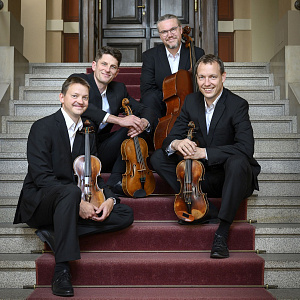
BENNEWITZ QUARTET
LISTENERS ARE OFTEN SURPRISED BY THE VIVACITY AND DIRECTNESS OF HAYDN’S MUSIC


The Bennewitz Quartet have given numerous concerts at major venues worldwide (Wigmore Hall in London, Musikverein Wien, Konzerthaus Berlin, Théâtre des Champs-Elysées in Paris, concert halls in New York and Seoul) and at significant international festivals (Salzburger Festspiele, Lucerne Festival, Rheingau Musik Festival, etc.). At many of them, they have performed quartets by Joseph Haydn, one of their favourite composers, whose music they endow with a transparent sound, revealing their levity and sense for detail. Haydn’s string quartets feature on the ensemble’s new album, released on Supraphon on Friday 26 May 2023. We talked about the new album with the Bennewitz Quartet violinist Štěpán Ježek.
Joseph Haydn has been acknowledged as having played a key role in forging the string quartet’s classical form. He created almost 70 string quartets, which, along with the symphonies, constitute the largest, as well as the most significant, part of his oeuvre. How did you put together the repertoire of your new Haydn album?
Our new album aims to show a certain part of Haydn’s development as a composer. The quartets comprising Op. 17 are generally considered early works. The pieces making up Op. 33 are written in an entirely different style, as Haydn himself pointed out. Op. 54 ranks among the composer’s top-notch mature creations. Truly fascinating is Haydn’s unceasing zest for experimentation, seeking novel ways and paths. The String Quartet in C major, Op. 54/2, is as innovative and teeming with non-classical compositional techniques as the String Quartet in G major, Op. 17/5. Sometimes I have the feeling that Haydn might have been so eagerly working on establishing the rules of composing Classical music as to be able to profit from their constant breaching. Our ensemble has played all the three string quartets contained on our new album for a long time, hence we have thoroughly familiarised ourselves with them as performers. Such an intimate knowledge has always been one of the most important aspects when selecting pieces for recordings.”
The Bennewitz Quartet have given concerts all over the world. Where have you performed Haydn‘s string quartets?
We have included Haydn in our concert programmes gladly and frequently. Accordingly, we have performed his music in many countries, from Japan to the USA. Haydn addresses the audience in a very straightforward way. By means of a variety of formal and harmonic somersaults or other musical surprises, he is capable of communicating with listeners directly and, now and then, amuse them. One of the pieces featured on our new album is even dubbed “Scherzo”, meaning “joke”. Listeners are often surprised by the vivacity and directness of Haydn’s music. Expecting that as a Classical composer Haydn would be somehow “untouchable”, they are astonished to perceive him as though he were standing right there before them on the stage, telling a funny story. When we succeed in this respect at a concert, we are always approached afterwards by several listeners eager to tell us how surprised they were by the vigour and imaginativeness of Haydn’s music.
The three quartets included on your new album chart the development of Haydn’s musical idiom, from Op. 17, which he wrote at the age of 40, to the formally experimental quartets making up Op. 54. How do you perceive such transformations when exploring his music?
One of the properties that evidently changed in Haydn’s music over the course of time is the roundness of the quartet sound. Op. 17 contains many extremely delicate and gentle passages, with the music coming across as tenderly translucent. Later on, Haydn’s musical language becomes fuller, with its sound being more compact. Op. 54 features quite a few moments that may take the listener aback by the vehemence of the striking tutti of the whole ensemble. The sound is a very sensitive aspect when making a recording, there is a lot of trial and error involved before attaining a satisfactory result. Playing into microphones placed mere decimetres from our instruments is totally different from performing music before hundreds of people at a huge concert hall. Yet the greatest challenge was to transfer into the recording something reflecting the live communication between us on the stage and the listeners in the auditorium. We deem such an authentic experience absolutely essential when it comes to Haydn’s music. We had to keep our playing fresh, crisp and witty, irrespective of the repetitions that simply cannot be avoided during recording. So we were immensely happy when we felt that, notwithstanding all the practical difficulties, we had managed to achieve our objective.
This year the Bennewitz Quartet are celebrating 25 years on the music scene. How will you mark this major anniversary?
We do no plan a special event, but will celebrate the anniversary at the numerous wonderful concerts we have scheduled for the forthcoming jubilee season. We will begin in advance – this July, when we will give our seventh performance at Wigmore Hall in London. In September we will appear at the Dvořák Prague festival along with superb Czech and foreign quartets of our generation. Later in the season, we will have several concerts in Germany, including at the Liederhalle in Stuttgart, and a concert for the Czech Chamber Music Society in Prague. Furthermore, we will make a tour of the USA, within which we will return to some venues and debut at others. And we are also mulling over other projects, yet haven’t arrived at anything specific. We will see what we will ultimately bring to fruition.